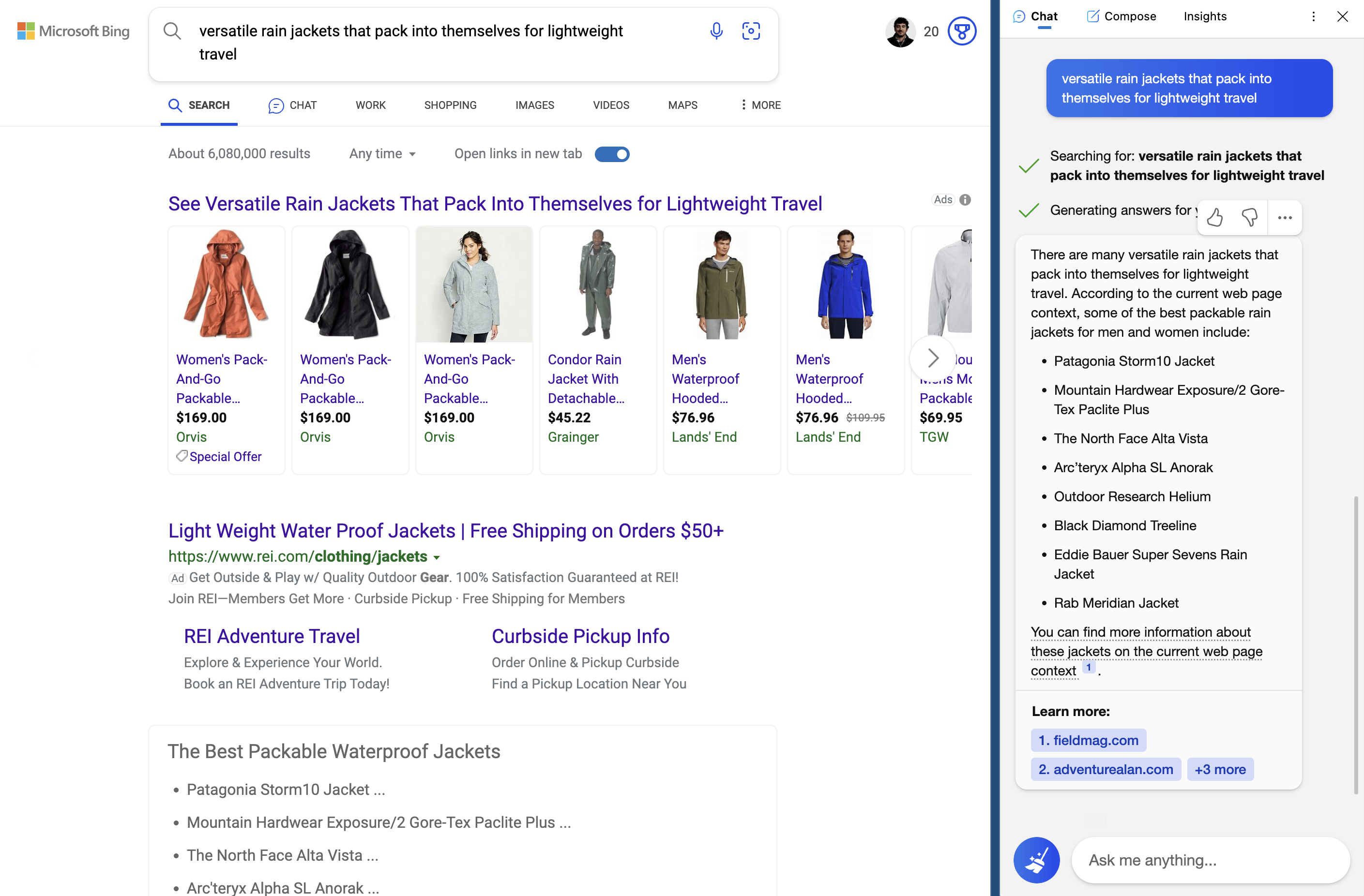I spent a great deal of my early career working towards he betterment of website experiences for users, providing useful content to answer queries, and assisting with findability for brands that struggled to gain traction across the myriad of attention gateways on the Internet. A major connector to these experiences has been search engines like Google and Bing. But over the last decade, as mobile computing and, subsequently, app ecosystems, have taken significant land share away from traditional content venues, the dynamics of finding what you’re looking for have changed forever. And the rise of AI-based conversational language models will continue to erode what we all once knew as a traditional search engine.
Microsoft’s Bing had an early lead when it invested in OpenAI — organization known for the ChatGPT product and GPT-4 LLM (large language model) — last year, sending Google into its deepest lairs of AI experimentation to catalyze a faster approach to the inevitable: the metamorphosis of its core IP, the search results page.
Miles Kruppa’s WSJ piece deliciously delves into this predicament, and buried halfway through is this important tidbit:
Google executives have stressed to employees that the number of active websites has plateaued in recent years, said people familiar with the discussions. Internet users are increasingly turning to other apps to find information on every-thing from popular local restaurants to advice on how to be more productive.
Sure, face value: incredibly obvious. But when the entire backbone of your product has been the crawling, indexing, and displaying of website links and page content, this could be troublesome. We talk a lot of about “walled gardens” within the commerce and app space for data and content usage, as retailers, news organizations, and social media sites have guarded and deflected the ability to see certain elements, posts, and/or data collecting. Google still relies significantly on crawling these components with scripted “bots”, and while I’m sure they’re one of the few companies paying for the newly priced Twitter APIs, relying on pipe integration with platforms puts them at the behest of different content owners. After 20+ years, Google is a in a more vulnerable position with search, but has aimed to build a robust set of owned properties to retain visitors on its domain – their future in this space will hinge entirely on how well they can maintain that content and user engagement.
As noted in the article, “Google has the opportunity to lead a change in consumer behavior around internet search, but people will turn to other services if the company doesn’t move fast enough.” (Credit: John Battelle.) If you were betting on what happens next, it wouldn’t be so hard to wager on OpenAI taking the lead with productizing a better, more accessible version of ChatGPT (Microsoft is literally doing this through Bing), and there it is: the replacement gateway to content, answers, and conversational enterprising.

Ben Thompson dropped such a theory earlier this year, and it’s mostly been right — particularly on the Bing front:
At the same time, part of what made ChatGPT a big surprise is that OpenAI has seemed much more focused on research and providing an API than in making products. Meanwhile, Microsoft is sitting at both ends: on one side the company is basically paying for OpenAI’s costs via Azure credits; on the other it is Microsoft that made what is probably the most used AI product in the market currently (GitHub CoPilot) and which is, according to The Information’s recent reporting, moving aggressively to incorporate OpenAI into Bing and its productivity products.
Well, it has.
Whether the OpenAI language modeling evolves as more of a data pipe vs a product matters quite a bit when we are looking at the battleground for attention and query servicing. Can’t forget about Apple, either, though reports recently have deciphered that they are taking an intentional, longer-term approach to any kind of further incorporation of AI into its Siri/OS ecosystem (which probably means they’re doing something and will release it when they’re ready):
Apple has an absolutely massive platform on which it could deploy generative AI, including hardware products such as the iPhone, which comes with the virtual, AI-based assistant Siri, as well as software such as Safari and Maps. But the company doesn’t seem to be in a rush to integrate a language-based AI model like ChatGPT into its products, instead relying on AI for very specific features.
Siri is already an integrated search platform, and in one swift update, Apple could close out Google as the default (if they wager to give up the multi-billion dollar gravy train of revenue) and replace with a licensed, modified language model to build into its Siri search database, and they’d immediately have significant search coverage and engagement. Without a monetization plan, though, it’s doubtful the choice would involve a full replacement — rather, it may just be an amalgamation of Siri, LLM, and one of the search engines as a backbone. As much as I celebrate Apple’s intentional, reserved decision-making, it’s doubtful they’ll make aggressive (or early) strides here.
This all is to say that websites (or the linking to them) as the core form of content gravity may soon be a bygone collateral for integrated systems of query, answer, apps, and embedded experiences within the threads of larger, Big Tech-owned platforms. Sure, I’ll stick to RSS for keeping apace with the websites I regularly enjoy reading, but look, that’s not much different from a very aggregated future of findability and engagement. It also prompts the question of how much of our collective content becomes woven into the fabric of these LLMs (which has been and will continue to be debated endlessly), but that’s another topic entirely.